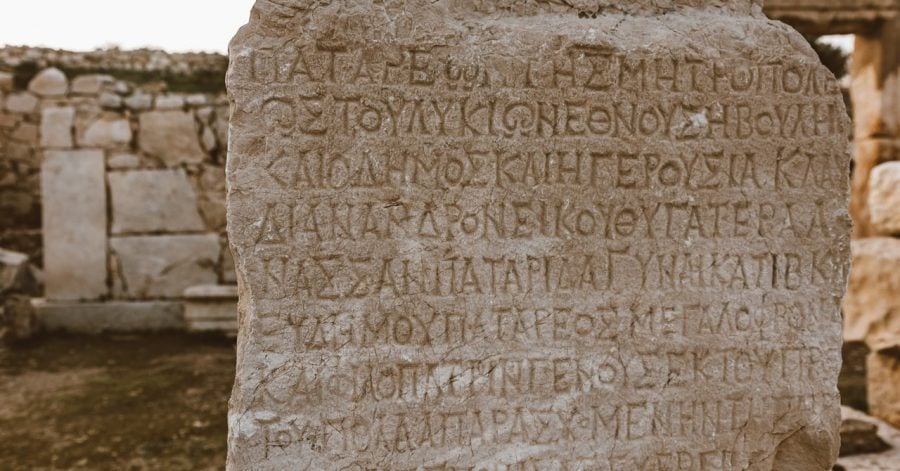While AI is mostly considered as a technology of the future, scientists and researchers have also found a way to utilize it when it comes to discovering the past. British artificial intelligence company DeepMind has come up with a solution which can restore missing parts from damaged inscriptions, identify their original location, as well as help establish the date they were created.
The AI solution called Ithaca is a deep neural network that can restore the missing text of damaged inscriptions and assist historians with identifying the original location and date of creation of such inscriptions. The research team includes scientists from the University of Oxford, and the team lead is the Greek scientist Yannis Assael.
“It all started in 2017 in a conversation with Dr. Thea Sommerschield discussing the most challenging tasks for historians. Immediately we saw the cooperative potential between AI and historical research. It is important to note here that our work addresses the tasks of textual restoration, geographical attribution and chronological attribution,” Yannis Assael tells The Recursive.
“The architecture of Ithaca focuses on collaboration, decision support and interpretability,” the researchers behind Ithaca also wrote in a paper published in Nature.
“Ithaca, which was named after the Greek island that eluded the hero Odysseus’ homecoming, was trained on inscriptions written in the ancient Greek language and across the ancient Mediterranean world between the seventh century BC and the fifth century AD,” the scientists noted.
Using mathematical models and techniques to identify and restore inscriptions
The model has been trained on a dataset consisting of more than 78 thousand inscriptions, using various mathematical models and techniques.
According to Yannis Assael, who has also been featured in Forbes’ “30 Under 30” distinguished scientists in Europe, the AI model achieved 71% accuracy in identifying their original location, and can date texts to within 30 years of their ground-truth date ranges.
“Most importantly, while Ithaca alone achieves 62% accuracy when restoring damaged texts, as soon as historians use Ithaca their own performance leaps from 25% to 72%, unlocking the potential for cooperation between AI and the humanities,” Assael, staff research scientist at DeepMind, wrote in a LinkedIn post. The Greek scientist is also a co-inventor on four patents and has co-developed a lip-reading model that outperformed humans.
In a blog post, DeepMind also describes how Ithaca can contribute to resolving different historical debates. The company points out the examples of how historians currently disagree on the date of a series of important Athenian decrees made at a time when notable figures such as Socrates and Pericles lived.
The decrees have long been thought to have been written before 446/445 BCE, although new evidence suggests a date of the 420s BCE, DeepMind explains.
“To test Ithaca’s predictions, we retrained it on a dataset that did not contain the dated inscriptions and then submitted these held-out texts for analysis. Remarkably, Ithaca’s average predicted date for the decrees is 421 BCE, aligning with the most recent dating breakthroughs and showing how machine learning can contribute to debates around one of the most significant moments in Greek history,” DeepMind emphasizes.
As DeepMind’s owner, Google is also involved in the project, with Google Cloud and Google Arts & Culture launching a free interactive version of Ithaca. According to DeepMind, the AI tool also builds up and improves on the company’s previous product called Pythia, which is focused on textual restoration.
The British company also noted that it doesn’t plan to stop here, as it is also working to develop versions of Ithaca that can work on other ancient languages.
“Ithaca’s architecture makes it easily applicable to any ancient language, from Latin to Mayan, and to any written medium, from papyri to manuscripts. We’re really excited to see the new directions Ithaca will take – and for this reason Ithaca’s is open-sourced and available online,” researchers Yannis Assael and Thea Sommerschield tell The Recursive, adding that the company sees lots of potential in interdisciplinary research on AI for culture and humanities.








